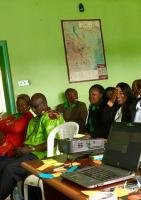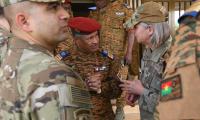Repeating coups and militant jihadists attacks suppresses democracy in Burkina Faso
On the 30th of September 2022, Burkina Faso experienced yet another coup - the second in just eight months. The military responsible for the coups has unsuccessfully sought to combat the militant jihadist groups wreaking havoc in the northern part of the country.

Since Burkina Faso's independence from France in 1960, the West African country has been tormented by drought, famine, and eight military coups. When the former president Blaise Compaoré was forced out of office by popular protests in 2014 after 27 years in power, many hoped for a democratic future in Burkina Faso.
Instead, militant Islamists have further destabilised the country, impeded the democratic development and worsened the humanitarian situation. In 2021, Burkina Faso ranked 184 out of 190 countries on the UN Development Index.
Seven years of conflict
Unrest in the neighbouring country of Mali spread across the border to Burkina Faso in 2015, and the country has since been plagued by repeated attacks from jihadists who have settled in the northern part of the country. Here, 68% of the population lives below the poverty line.
It is particularly the Al-Qaeda affiliated group, Jama'at Nusrat al-Islam wal-Muslimin (JNIM), which is behind the attacks. Today, the entire Sahel region is troubled by the fight against the jihadist groups, who exploit the sparsely populated areas near the Sahara Desert to move freely across borders and avoid the various states' militaries.
Public frustration over lack of peace results
In January 2022, Burkina Faso’s president Roch Marc Christian Kaboré was ousted in yet another military coup following large-scale public protests. Kaboré had come to power in a rare democratic election in Burkina Faso in 2015 and was re-elected in 2020.
Large parts of the population were dissatisfied with the government's lack of results in the fight against the jihadists and the military cooperation with France, which continued to uphold a heavy military presence in its former colony. From the military's point of view, the president did not give them sufficient resources to combat the jihadists.
Conflict only worsened since the coup in January
Colonel Damiba immediately began restructuring the military and attempted to engage in dialogue with JNIM. Despite the measures, the fighting only increased. In the first month of Damiba’s tenure alone, 160,000 people had to flee their homes, and in the first half of 2022, there was an increase in attacks of 35% compared to 2021.
Today, Burkina Faso is the country in the Sahel, which experiences the highest number of attacks by the terrorist groups, and the military junta is estimated to have control over only 60 % of Burkina Faso's territory - the rest is dominated by the jihadists. Two million Burkinabe, ten percent of the total population, are today displaced from their homes.
The last major attack took place on the 6th of September, when 35 civilians were killed in a bomb attack on a convoy in northern Burkina Faso. This led to Damiba dismissing the country's Minister of Defence and taking over the post himself on the 13th of September. The military junta has also imposed a military state of emergency in several regions and forcibly relocated the population from these.
Another coup
On the 30th of September, Damiba himself experienced being ousted in a military coup based on the same criticism that he had directed at Kaboré eight months earlier: a lack of success in combating the jihadists and too close ties to France.
The leader of the coup is the mere 34-year-old Captain Ibrahim Traore, who was one of Damiba's supporters in January. He proclaimed himself the country's interim leader and on the 2nd of October, Damiba officially stepped down as President of Burkina Faso.
Political parties' role under a military regime
Since 2018, DIPD has supported the Center for Multiparty Democracy - CGD, in facilitating a cross-party dialogue program in Burkina Faso. The partnership has focused on the establishment of a multiparty platform, political dialogues between 15 political parties in parliament, capacity building of young and female members of the political parties, and study trips and exchange of experiences with delegates and young people from political parties in Burkina Faso and Denmark.
The coup in January led to the dissolution of the former parliament in Burkina Faso. With the military coup came an interim government with a transition charter, which gave political parties the opportunity to continue their activities during this transitional period. However, with very limited democratic influence on the government.
Therefore, the multiparty platform had to adjust its activities to strengthen reflection, political dialogues, and capacity building of socio-political actors in Burkina Faso. The intention is that the multiparty platform and the political parties in Burkina Faso, will be able to support the re-establishment of a more democratic government in the future.
The Burkinabe now hope that the new military junta can achieve what none of its predecessors manged and create the much-needed stability and security in the country. At DIPD, we follow the developments closely, in dialogue with our partners who continue to fight for a democratic Burkina Faso, despite the uncertain situation and difficult conditions.

Strengthening Multiparty Democracy in Burkina Faso
DIPD partners with Centre pour la Gourvernance Démocratique (CGD) on stregthening intra- and inter-party dialogue through dialogue platforms.



